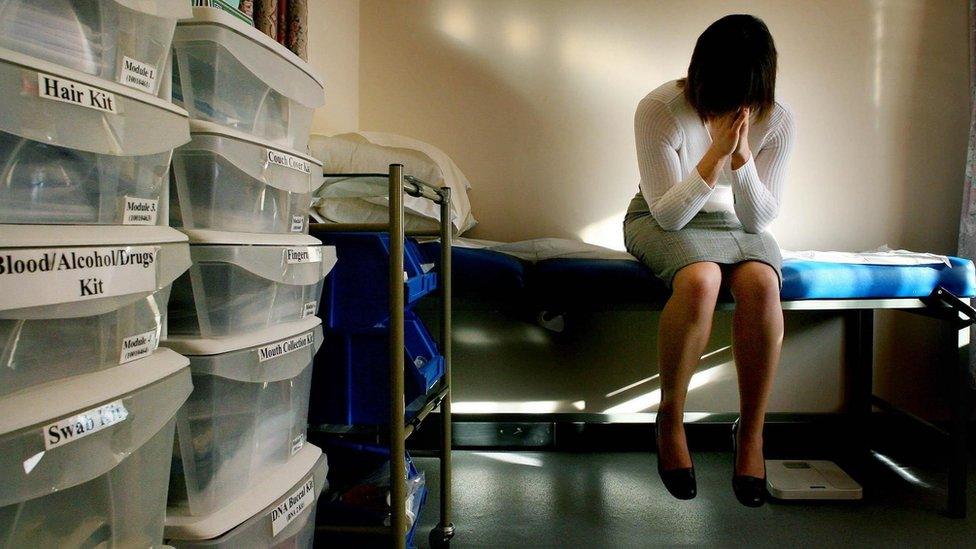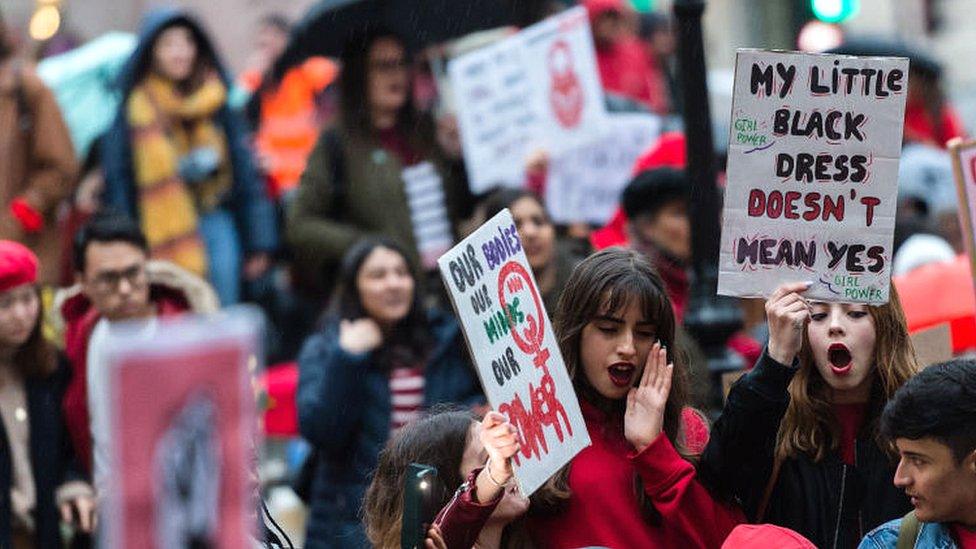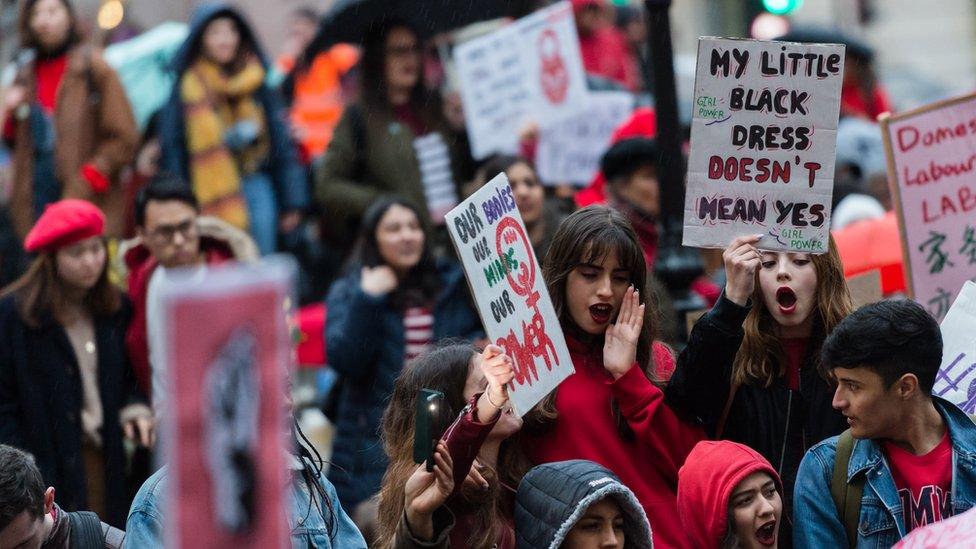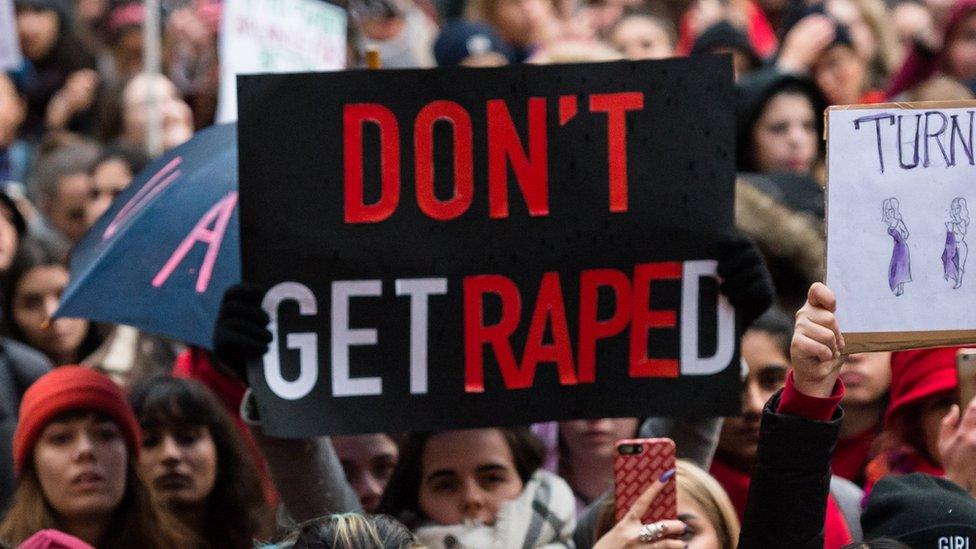Rape convictions fall to record low in England and Wales
- Published

The number of rape convictions in England and Wales has fallen to a record low, according to new Crown Prosecution Service (CPS) data, external.
In 2019-20, 1,439 suspects in cases where a rape had been alleged were convicted of rape or another crime - half the number three years ago.
The number of completed prosecutions in "rape-flagged" cases was the lowest since tracking began in 2009.
The CPS said it was "working hard to reverse the trend".
It has announced a "five-year blueprint" to reduce the "gap" between reported cases of sexual violence and those which come to court.
The initiative involves improved working between CPS lawyers and police, "fully resourcing" specialist units for the prosecution of rape and sexual offences and "clear, proportionate" legal advice to investigators so they can focus on "reasonable lines of enquiry".
Max Hill QC, the director of public prosecutions, said: "It is clear that more needs to be done both to encourage victims to come forward with confidence, and to support them through the criminal justice process so the gap between reports of rape and cases that reach the courts can be closed."
He told BBC Radio 4's Today programme that while he does "accept the scale of the problem" in falling prosecutions and convictions, "serious mistakes" were being made "three or four years" ago. These included cases going to court "which shouldn't have", said Mr Hill.
He denied that the CPS has a "target" number of convictions that it applies for rape or any other areas of crime.
He added that that the five-year strategy being launched by the CPS is "saying these are the actions which we will take together with our partners in the police to address what we recognise is a real problem".
The CPS began closely tracking details of rape cases in 2009-10 as part of its "violence against women and girls" strategy.
That year, 2,270 suspects in "rape-flagged" cases admitted an offence or were found guilty after a trial.
The number fluctuated between 2,300 and 2,600, before reaching a high of 2,991 in 2016-17 - but it has fallen sharply since then.
'Rape de-criminalised'
Overall prosecutions - which include those that end in an acquittal - also peaked in 2016-17, with 5,190 completed cases - but dropped to 2,102 last year.
Harriet Wistrich, founder of the Centre for Women's Justice, said: "Potentially it is sending out a message that rape is de-criminalised, virtually. It is very unlikely that it will ever be prosecuted, particularly in cases where there is intoxication. What does that tell men who are determined to rape? It gives a very worrying message."

Campaigners say the decline gives a "very worrying message"
Other figures, seen by the BBC, suggest the decline in rape prosecutions may have deterred some police from submitting cases for charging decisions.
Informed sources claimed some investigators were frustrated that growing numbers of rape cases they had worked on were not resulting in a prosecution and were more selective about which ones they sent forward for a charging decision.
In 2019-20, the police referred 2,747 cases to the CPS, a reduction of 40% in three years and the lowest number since the figures were first published in 2014-15.
Ms Wistrich said: "We have heard anecdotally, police won't refer a case where there isn't a huge amount of corroborating evidence where there is a dispute as to consent."
It is also taking longer for suspects to be charged, with the average time from a case initially being referred to the CPS to a decision to charge up from 53 days in 2015-16 to 145 days in 2019-20, which is almost five months.
The period does not include the time spent investigating the case prior to referral nor the time between someone being charged and tried.
Previously, the delays have been partly blamed on the volume of digital evidence, particularly from smart-phones, that detectives have to trawl through.
'No complexity'
The Victims' Commissioner Dame Vera Baird described the rape statistics as "utterly shameful", external and called on the CPS to change its handling of rape cases "now, not in half a decade".
In a statement, she urged Mr Hill to "immediately" reverse a CPS policy she said is leaving "thousands of rape complainants without the chance of justice" even when "they appear to have a strong evidential case".
She said: "There is no complexity in why rape prosecutions and convictions have crashed.
"It is a policy by CPS only to take only rock-solid prosecutions as set down in a CPS document in 2016/17 by the director of legal services and personally driven by him nationwide."
She said the CPS had cut the volume of cases they charge "for the sake of getting a higher rate of convictions" and called for an end to that "today".
Meanwhile, Nazir Afzal, the former chief Crown prosecutor for the north-west of England, said rape is "possibly the hardest of crimes to prosecute but this looks like they've given up", adding that victims deserved "better".
Allow X content?
This article contains content provided by X. We ask for your permission before anything is loaded, as they may be using cookies and other technologies. You may want to read X’s cookie policy, external and privacy policy, external before accepting. To view this content choose ‘accept and continue’.

Local 'gatekeepers'
The CPS said the drop in rape prosecutions was "a major focus" of its work and it had been "working hard to reverse the trend we've seen in recent years".
"It is early days, but there are encouraging signs with a steady increase in both the proportion and number of cases charged," a spokesperson said. "If our legal test is met, we always seek to prosecute."
The CPS added that due to the time it takes to investigate and prosecute a case any changes may take some time to be seen in the data.
A joint statement from the National Police Chiefs' Council's leads for rape, domestic abuse and charging said the fall in the number of convictions was "very concerning for us".
It said there were a number of reasons behind the drop in referrals, many due to changes in the way forces operate.
"Over recent years we have worked hard with the CPS to streamline the process and have introduced local 'gatekeepers' who can test evidence and give investigators advice, helping to improve cases, without the necessity for a referral," the statement said.
"However, we are hearing from our officers that it is becoming harder to achieve the standard of evidence required to charge a suspect and get a case into court. Victims tell us clearly how important it is to them to have the evidence tested in this way.
"Investigators are working incredibly hard to try and reach that standard, but in some occasions when they are unable to do so they are taking local decisions through gatekeepers and supervisors."

ASK MARTIN LEWIS: Answering your questions about travelling to Spain

- Published27 May 2022

- Published30 January 2020

- Published17 December 2019
